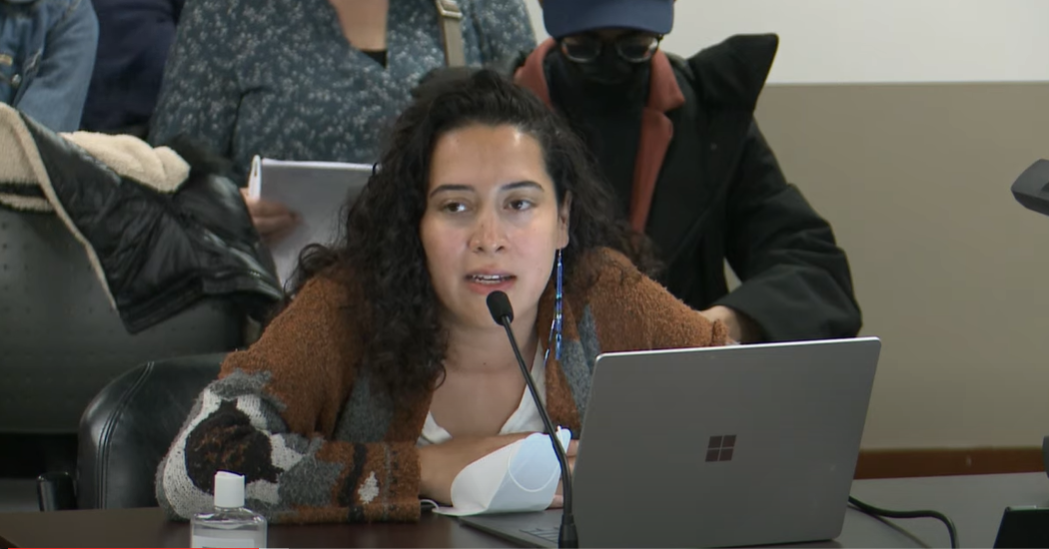
2023 City Budget Deputation
YWCA Toronto
Oral Presentation to the City of Toronto's Budget Committee
January 17, 2023
Good afternoon everyone. Thank you for the opportunity to address the committee today.
My name is Jasmine Ramze Rezaee, and I am the Director of Advocacy and Communications at YWCA Toronto, the city’s largest multi-service organization serving women, girls, and gender diverse people.
The more than 13,000 people we serve across the city depend on our services to escape gender-based violence, access safe and affordable housing and emergency shelter, and secure employment.
Many of our programs are funded by the City, a partnership for which we are grateful. We are encouraged by the progress the City is making on the HousingTO Action Plan, and we appreciate the significant financial pressures facing the City.
However, we feel strongly that the proposed 2023 Budget does not address the level of crisis facing our community members.
As a frontline agency, we have witnessed a rise in demand for our services and a deepening of crisis. Three years of COVID have contributed to a rise in gender-based violence, food insecurity, poverty, and worse mental health and addiction outcomes. Temporary income security measures such as CERB have ended. Inflationary pressures coupled with a rise in rents have meant many women experiencing abuse at home have nowhere to turn – our shelter systems are at capacity and there are not enough affordable housing units being built quickly enough, especially not enough affordable units with a range of supports, to keep up with urgent demand.
The shelter system is still reeling from multiple COVID outbreaks and the impact on both staff and residents, and VAW services are no longer able to access COVID-specific funding that minimizes service disruption and the associated costs.
As a political document, this budget seems to prioritize less effective means of addressing community needs – such as policing – over investments into proven community services. For example, the tabled budget proposes an additional investment of $3 million into the Poverty Reduction Strategy, in contrast to an additional investment of $48 million to the police budget. The City seems to be spending more money to police poverty than to address the root causes of it, which is a short-sighted strategy.
Some enhanced investments also seem misguided. For example, we know there is an uptick of violence on the TTC – but reducing service levels and increasing fees will not return ridership or enhance feelings of safety for women on public transportation. Crowded buses and cuts to off-peak service hours disproportionately impact women, shift workers and people living with disabilities.
Also, simply hiring more special constables who double as fair collectors is unlikely to make the TTC feel safer for Black, Indigenous and racialized community members. Of course, safety on public transportation is paramount but the conditions that uphold safety must be explored and invested in as much as security measures. Security does not equate to safety.
Those who use the TTC to stay warm or stay safe may not have anywhere else to go – what they need is mental health and addiction support, housing with supports, and a warm meal – not the fear of arrest. Rather than simply scaling up the current system, we call on the TTC to develop a trauma-informed safety plan with safety officers who are trained in de-escalation and outreach and are sensitive to the specific needs of women. And, it will be important that this plan be developed through extensive community consultation and by people who actually use the TTC.
While there has been a property tax increase, which we support, no other new revenue tools have been introduced to address the mounting crisis faced by essential services. For several years we have urged the City to explore new revenue tools. We would encourage Council to explore a commercial tax levy, as well as other sources of revenue, to respond to growing and emerging community needs.
And, as an organization that has partnered with the City on both the Gender Equity Office and the Equity-Responsive Budgeting process, we want to confide in you that we are thoroughly disappointed not to see any investments in the Gender Equity Strategy, which is supposed to be released this year after long delays, nor to see any mention of it. The Equity-Responsive Budgeting process has continued to restrict the analysis to changes in service levels – rather than ask the bigger and more important question, is the budget line actually sufficient to address the crisis at hand? That analysis, and those conversations, seem to be missing from the budget altogether. They have also been sidelined internally at the City as community members who were invited to be part of the External Review Panel to provide feedback on the Equity-Responsive Budgeting process are no longer invited to do so. The External Review Panel has been cut entirely without any consultation with community members.
Again, we understand the City is facing many fiscal pressures, but we are worried that this proposed budget has taken an old approach to new and growing problems.
As you reflect on all of the deputations over these next three days, we do hope you will seriously listen to the urgent pleas of community members, consider enhanced funding measures and new revenue tools for future years, and creatively support improved access to services, in full and equal partnership with community agencies. Please listen and take action.
Thank you very much for your time.
--
Jasmine Ramze Rezaee is the Director of Advocacy and Communications at YWCA Toronto.